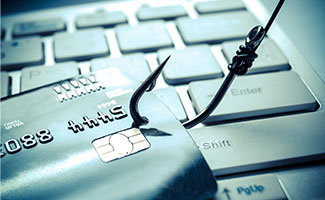
Fraud & Security
Protecting your accounts is our top priority
It’s becoming easier every day for fraudsters to steal your information, so protecting your information is more important than ever. It is our commitment at TXDPSCU to protect your personal and financial information. We have implemented multiple layers of security to keep your information safe because it is our number one priority.
Spotting fraud can seem overwhelming and difficult when in the midst of a situation. We’re here to help you feel more confident spotting scams so you can protect yourself and your money.
Know how to recognize and avoid scams
Imposter Scam
These scammers will contact you pretending to be your financial institution, a government agency such as the IRS, Medicare or even a charitable organization and trick you into sending money or providing personal or account information. These scams can be very sophisticated and seem quite real.
| Tip for spotting this scam: Watch out for anyone reaching out to ask for personal information to verify your account or asking for payment via gift cards, wire transfers or person-to-person transfers. Legitimate companies will not call to ask for your personal information or for payment. |
Urgency Scam
Urgency scams trick you into taking advantage of an unbelievable deal or collecting a prize, giving you a tight time frame in which to act. Their tone is urgent, and they want to steal your personal or financial information by asking you to do things like create an account or verify a password.
| Tip for spotting this scam: Reputable companies or organizations won’t pressure you to react with tight time constraints or countdown clocks. If an email is asking you to act fast for the deal of a lifetime or to accept a prize, take a pause. Avoid clicking on any links until you verify if the email is legitimate through a secondary source. |
Phishing Scam
Phishing scams are official-looking emails, text messages or social ads meant to trick you into giving your personal or financial information. Because these appear to be from your bank or other known companies, they can be very effective in tricking you into sharing information.
| Tip for spotting this scam: Look out for generic greetings, misspellings of words, grammatical errors or variations of logos or names of known companies. Avoid clicking links or downloading files as these can deliver malware to your device. Phishing scams can lead to identity theft. |
Support Specialist Scam
Scammers pretending to be a Technology Specialist from a known company try to steal your information by gaining access to your account or device. These scammers want to trick you into thinking that your computer or device is damaged and ask for remote access or for your account information to help you resolve the issue.
| Tip for spotting this scam: Support specialists from legitimate companies do not cold-call to help you fix an issue with your device or account, nor will they ask you to download an app or request access to your device. |
Pay Yourself Scam
This scam is often a text or an email that looks like a fraud alert from your bank asking if you authorized a transaction. If you respond, they’ll call as a bank representative offering to help you stop the alleged fraud and ask you to send money to yourself via transfer or person-to-person payment. Because they look like a real bank fraud alert and the incoming call can seem legitimate, these types of scams seem very convincing.
| Tip for spotting this scam: Your bank will never call you to verify information or ask you to send money to yourself or anyone. Do not give out any personal information over the phone or through email. |
Want to know more?
Learn about scams that are targeting you and your family members.
Helpful tips to keep your information safe
Choose unique passwords
Pick phrases that are easy for you to remember and add capital letters, numbers, and symbols to bolster its strength and update passwords every 90 days. Avoid repeated passwords for different logins.
Avoid public Wi-Fi and computers
Avoid using public Wi-Fi and computers to access your banking app or any other account that can be susceptible to getting breached, like your email.
Never give out personal information
Unless you’re certain that you’re communicating with a trusted company, do not give any sensitive information over the phone. It may be a phishing scam.
Protect your devices from attack
Always use strong passwords. Use security software such as antivirus protection and firewalls. Keep your operating system and browsers up to date since these updates can fix security issues.
Use two-factor authentication
This safety measure sends a code to your phone or email for a two-step login process that ensures you’re the only person accessing your account and all pertaining sensitive information.
Sign up for alerts
Get notifications when a purchase above a certain dollar amount is made or whenever money is withdrawn from the account.
Avoid clicking links in suspicious emails, text messages or landing pages
It’s best to type out the whole URL of the website you’re logging on to and avoid clicking on links found in emails if you’re not sure who they’re from.
Only download the official banking app
Only use our official mobile banking app linked from our website to your Android or Apple app provider. Never download our app from an open source.
How our Online & Mobile Banking App help keep your money & information secure
Offers control, convenience and transparency across your debit and credit cards. Card Management gives you an added layer of security by providing one place for you to set limits and alerts, manage travel plans, monitor for fraud, track card usage and more.
Bill Pay provides you with the security and convenience of managing and paying bills without worrying about checks getting lost, sorting through mounds of paper, or buying stamps. Pay all your bills from one place. Through Bill Pay, you can set up AutoPay to manage and set up recurring bills and eBill payments with the peace of mind of knowing that your bills are paid securely and on time every month. Change or cancel recurring payments anytime.
Manage all your bills without third-party apps or trips to the mailbox. Receive your electronic statements through your online banking account or mobile banking app. With eBill, it is safe and easy to manage and pay your bills from one place.
Compromised Information
Online Banking Credentials
Make sure to change your password immediately, and if you’ve used that password on other platforms, be sure to reset those account passwords as well. If the compromised account had payment information stored on it, review your transaction history to ensure no one has made purchases on your account.
Card Number
Card fraud is one of the most common forms of fraud and identity theft. If a transaction is posted to your account that you didn’t authorize or you think you’re a victim of identity theft, be sure to turn your card off immediately through our Mobile Banking App and contact us immediately at (512) 452-5211. Once your new card is issued, make sure to update auto pay and payment information stored elsewhere.
Bank Account Information
Contact your financial institution immediately to close your account and get a new one opened for you. Make sure to review your transactions regularly to ensure no one is making purchases on your account. Once your new account information is provided and a new card is issued, make sure to update auto pay and payment information stored elsewhere.
Suspicious Activity
If you have any questions or wish to report anything suspicious, contact us at 1-877-252-9199. Make sure you have our Mobile Banking App also so you can turn your card off.
Card Fraud: How to Protect Yourself
With the advent of online commerce, credit and debit card fraud has exploded. Here, we’ve outlined what you need to know about credit and debit card fraud, how to protect yourself, and what to do when you’re targeted.
Protect Yourself from Fraud
It’s important to us that you take every precaution to protect yourself from fraud. Here are some simple steps you can take to avoid becoming a victim of this growing crime.
Beware of Fake Calls & Texts From Scammers Posing as TXDPSCU
Fraudsters keep finding new ways to trick people into giving them personal information. We’re here to help prevent that.
Want to read more articles?
Stay connected by reading our blog.


